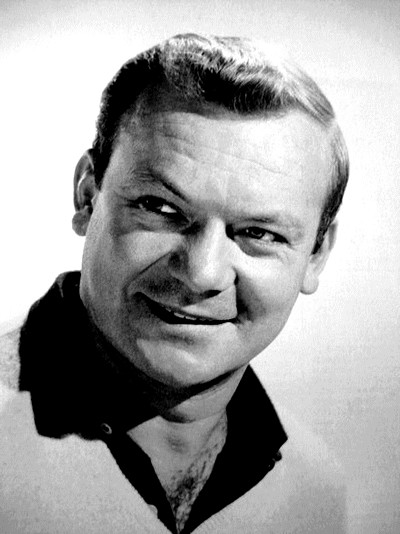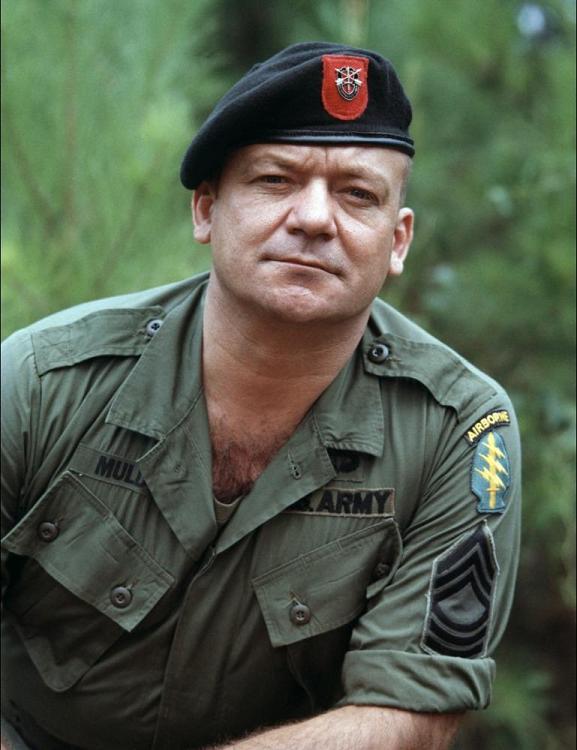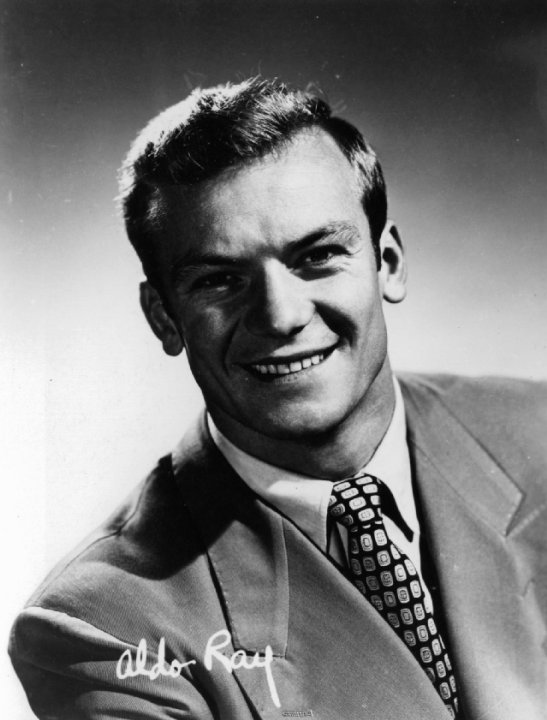Aldo Ray (Aldo Ray)

Ray was born in Pen Argyl in Northampton County in eastern Pennsylvania, to an Italian family of five brothers and one sister. His brother, Mario DaRe (1933-2010), lettered in football at USC in the years 1952 to 1954, and on May 12, 1955 appeared as a contestant on the NBC quiz show You Bet Your Life hosted by Groucho Marx. In 1944, at age 18, during World War II, he entered the United States Navy, serving as a frogman until 1946; he saw action at Okinawa with UDT-17. Upon leaving the Navy, he entered the University of California at Berkeley, but his studies there were brief. Shortly after leaving Berkeley, he settled in Crockett, California, with his first wife, Shirley Green. They had one child, a daughter named Claire. While serving as police constable of Crockett, Aldo drove his brother Guido to an audition for the film Saturday’s Hero (1951). Director David Miller was more interested in Aldo than his brother, because, it is rumored, of his voice, and hired him for the small role of a cynical college football player opposite John Derek and Donna Reed. Columbia Pictures wasted no time in signing Ray to an exclusive contract, and despite having no acting experience, Aldo soon appeared in several films under his birthname, Aldo DaRe. Ray’s husky frame, thick neck, and raspy voice made him perfect for playing tough sexy roles. In his first film as Aldo Ray, he starred with Judy Holliday in The Marrying Kind (1952), directed by George Cukor. Cukor famously suggested that Ray go to ballet school because he walked too much like a football player. That same year, Ray appeared in Pat and Mike, starring Spencer Tracy and Katharine Hepburn, again directed by Cukor. Ray’s work in Pat and Mike led to his nomination, along with Richard Burton and Robert Wagner, for a Golden Globe as Best Newcomer. Burton won the award that year, but Ray’s career was launched. Columbia Pictures head Harry Cohn liked Ray and wanted him for the role of Private Robert Prewitt in From Here to Eternity (1953) but Fred Zinnemann insisted Montgomery Clift be cast. In 1953, he and first wife Shirley Green were divorced. He starred opposite Rita Hayworth in Miss Sadie Thompson (1953), a remake of the W. Somerset Maugham story Rain. This began the most productive period of Aldo’s career, preceded by his marriage to actress Jeff Donnell (from 1954 to 1956), which also ended in divorce.
In 1955, Ray featured in starring roles in Battle Cry, Three Stripes in the Sun, and one of his best-loved films, We’re No Angels (1955), in which he starred with Humphrey Bogart, Peter Ustinov, Basil Rathbone, Leo G. Carroll, and Joan Bennett. In 1956, in between appearances in Three Stripes In The Sun and Men in War, Ray tried his hand at radio, working as a personality and announcer at Syracuse, New York hit music station WNDR. A photo of Ray with a colleague in the WNDR studios, taken as part of a station promotional package, survives and can be found on a WNDR tribute website, although it’s not known if any aircheck tapes of his radio shows still exist. By 1957, in any event, he had left WNDR and the radio business and returned to Hollywood. He would appear in 11 films during the following 11 years (1957–68), the busiest period of his film career. On January 31, 1957, Ray appeared on NBC’s The Ford Show, Starring Tennessee Ernie Ford. He and Tennessee Ernie Ford did a comedy skit from a foxhole. He also appeared on an episode of Bonanza “The Wild One” as a horse wrangler, October 4, 1964 Author Richard Matheson said that his best-known work, The Incredible Shrinking Man, was inspired by a scene in Aldo Ray’s Let’s Do It Again in which a character puts on someone else’s hat and it sinks down past his ears; “I thought, what if a man put on his own hat and that happened?” he recounted in an interview for Stephen King’s non fiction work Danse Macabre. This period of Ray’s career would culminate with a starring role in God’s Little Acre (1958), an adaptation of Erskine Caldwell’s controversial novel, starring Robert Ryan and Tina Louise. Ray appeared in The Naked and the Dead, an adaptation of Norman Mailer’s novel. He starred in 1959 in Four Desperate Men (The Siege of Pinchgut). The movie was filmed on location in Sydney Harbour, Australia. Pinchgut is actually Fort Denison. The film was the last produced by Ealing Studios, a small British Studio which lasted from 1939 to 1959. In 1959, Ray was cast as Hunk Farber in the episode, “Payment in Full” of the NBC western series, Riverboat. In the story line, Farber betrays his friend and employer to collect reward money, which he uses to court his girlfriend, Missy.
By the dawn of the 1960s, Aldo was most often typecast as the tough guy, capitalizing on his husky good looks and gravelly voice. He married Johanna Bennet, who continues to work today under the name Johanna Ray, as a respected casting director. They were divorced in 1967. Johanna Ray, a longtime collaborator with David Lynch, cast her son Eric DaRe with Aldo in Lynch’s Twin Peaks series, as well as the movie Twin Peaks: Fire Walk with Me. Aldo’s work of this decade included The Day They Robbed the Bank of England, What Did You Do in the War, Daddy?, Dead Heat on a Merry-Go-Round and Welcome to Hard Times. His best-known work of the 1960s however, was his portrayal of Sergeant Muldoon, alongside John Wayne, in The Green Berets. Ray made Kill a Dragon and Suicide Commando. He also made two television pilots in the 1960s; neither was picked up. As the 1960s ended, Hollywood’s appetite for Ray’s machismo started to wane. Though he worked steadily in the 1970s, the quality of his roles diminished, and he was typically cast as gruff and gravelly rednecks. In 1976, Ray appeared in Haunted, and also a pornographic movie, Sweet Savage, in a non-sexual role. His career decline accelerated in the 1980s, and after being diagnosed with throat cancer, he accepted virtually any role that came his way to maintain his costly health insurance. His SAG membership was revoked when it was discovered he was acting in non-union productions. His last film was Shock ‘Em Dead in which he appeared with Traci Lords and Troy Donahue. Ray remained in Crockett, with his mother and family and friends, where he died of throat cancer on March 27, 1991. He was cremated and buried in Crockett, with a majority of the residents coming out to pay their respects. The Crockett Museum has a display depicting his life.
Born
- September, 25, 1926
- USA
- Pen Argyl, Pennsylvania
Died
- March, 27, 1991
- USA
- Martinez, California
Cause of Death
- throat cancer
Other
- Cremated



